Add this eBook to your basket to receive access to all 76 records. Our indexes include entries for the spelling pilkinton. In the period you have requested, we have the following 76 records (displaying 11 to 20): These sample scans are from the original record. You will get scans of the full pages or articles where the surname you searched for has been found. Your web browser may prevent the sample windows from opening; in this case please change your browser settings to allow pop-up windows from this site. Inhabitants of Manchester
(1601)
The Court Leet and View of Frankpledge of the manor of Manchester in Lancashire was held twice a year on the first Thursdays after Easter and Michaelmas. The record of each court starts with a list of the jurors, and then records the deaths of tenants and burgesses, with the names of their heirs, who were to do suit to the court; and transfers of burgages by sale, and homage of new burgesses. Then there are presentments of all manner of minor enroachments and misdemeanours, such as blocking of ditches, stopping of highways, noisome drains, &c. Finally there are new general ordinances, often with the appointment of officers to see that they are enforced. Every Michaelmas saw the swearing in of a long list of officers for the coming year, including the borough reeve, constables, market lookers, mise layers and gatherers, sealers of leather, officers for fruit and wholesome bread and (the prevention of) football, aletasters, bylawmen (burleymen), scavengers, (ap)praisers, catchpole, swineherd, and also the affeerers, who judged the fines to be levied by the court. These posts were filled by householders or their appointees. The sample scan is taken from 1597. This index covers the court of 8 October 1601. | Sample scan, click to enlarge
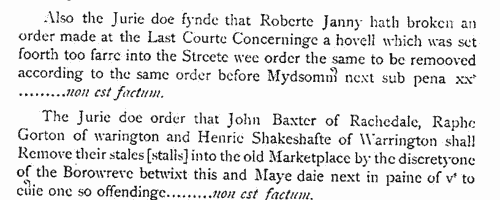
| Inhabitants of Manchester
(1602)
The Court Leet and View of Frankpledge of the manor of Manchester in Lancashire was held twice a year on the first Thursdays after Easter and Michaelmas. The record of each court starts with a list of the jurors, and then records the deaths of tenants and burgesses, with the names of their heirs, who were to do suit to the court; and transfers of burgages by sale, and homage of new burgesses. Then there are presentments of all manner of minor enroachments and misdemeanours, such as blocking of ditches, stopping of highways, noisome drains, &c. Finally there are new general ordinances, often with the appointment of officers to see that they are enforced. Every Michaelmas saw the swearing in of a long list of officers for the coming year, including the borough reeve, constables, market lookers, mise layers and gatherers, sealers of leather, officers for fruit and wholesome bread and (the prevention of) football, aletasters, bylawmen (burleymen), scavengers, (ap)praisers, catchpole, swineherd, and also the affeerers, who judged the fines to be levied by the court. These posts were filled by householders or their appointees. The sample scan is taken from 1597. This index covers the court of 14 October 1602. | Sample scan, click to enlarge
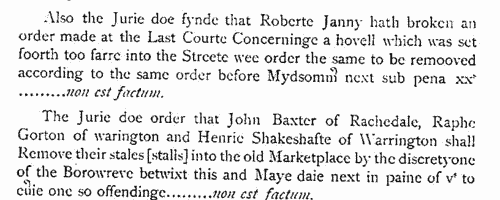
| Salford Portmote
(1602)
The earliest surviving records of the portmote of the borough of the township and manor of Salford in Lancashire were transcribed and edited by J. G. de T. Mandley and published by the Chetham Society in 1902. The court was held after Easter and Michaelmas each year. The record usually starts with a list of jurors, sometimes with a general suit roll. Officers are appointed in the autumn court - borough reeve, constables, miselayers, burleymen, alefounders, scavengers, and overseers for the pump. Where a freeholder had died since the previous court, an inquiry was made as to his or her heir. There are presentments of minor offences, particularly affrays and selling ale contrary to statute. 19 October 1602
| Sample scan, click to enlarge
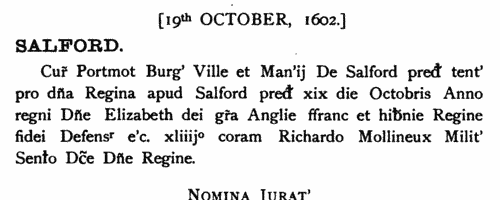
| Inhabitants of Manchester
(1604)
The Court Leet and View of Frankpledge of the manor of Manchester in Lancashire was held twice a year on the first Thursdays after Easter and Michaelmas. The record of each court starts with a list of the jurors, and then records the deaths of tenants and burgesses, with the names of their heirs, who were to do suit to the court; and transfers of burgages by sale, and homage of new burgesses. Then there are presentments of all manner of minor enroachments and misdemeanours, such as blocking of ditches, stopping of highways, noisome drains, &c. Finally there are new general ordinances, often with the appointment of officers to see that they are enforced. Every Michaelmas saw the swearing in of a long list of officers for the coming year, including the borough reeve, constables, market lookers, mise layers and gatherers, sealers of leather, officers for fruit and wholesome bread and (the prevention of) football, aletasters, bylawmen (burleymen), scavengers, (ap)praisers, catchpole, swineherd, and also the affeerers, who judged the fines to be levied by the court. The sample scan is taken from 1597. This index covers the court of 2 October 1604, with an adjournment to 9 October 1604. | Sample scan, click to enlarge
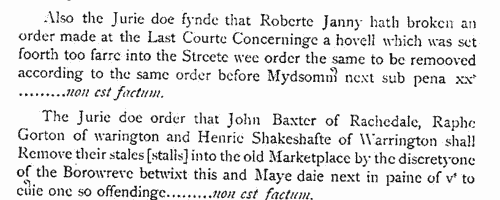
| Inhabitants of Manchester, Lostock and Rumworth, and Hulton (near Bolton)
(1605)
The Court Leet and View of Frankpledge of the manor of Manchester in Lancashire was held twice a year on the first Thursdays after Easter and Michaelmas. The record of each court starts with a list of the jurors, and then records the deaths of tenants and burgesses, with the names of their heirs, who were to do suit to the court; and transfers of burgages by sale, and homage of new burgesses. Then there are presentments of all manner of minor enroachments and misdemeanours, such as blocking of ditches, stopping of highways, noisome drains, &c. Finally there are new general ordinances, often with the appointment of officers to see that they are enforced. Every Michaelmas saw the swearing in of a long list of officers for the coming year, including the borough reeve, constables, market lookers, mise layers and gatherers, sealers of leather, officers for fruit and wholesome bread and (the prevention of) football, aletasters, bylawmen (burleymen), scavengers, (ap)praisers, catchpole, swineherd, and also the affeerers, who judged the fines to be levied by the court. These posts were filled by householders or their appointees. The sample scan is taken from 1597. This index covers the court of 4 April 1605, on which the names of the tithingmen of Lostock & Rumworth and of Hulton (near Bolton) were also recorded. | Sample scan, click to enlarge
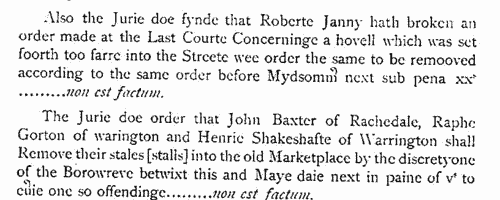
| Inhabitants of Manchester
(1606)
The Court Leet and View of Frankpledge of the manor of Manchester in Lancashire was held twice a year on the first Thursdays after Easter and Michaelmas. The record of each court starts with a list of the jurors, and then records the deaths of tenants and burgesses, with the names of their heirs, who were to do suit to the court; and transfers of burgages by sale, and homage of new burgesses. Then there are presentments of all manner of minor enroachments and misdemeanours, such as blocking of ditches, stopping of highways, noisome drains, &c. Finally there are new general ordinances, often with the appointment of officers to see that they are enforced. The sample scan is taken from 1597. This index covers the court of 24 April 1606. | Sample scan, click to enlarge
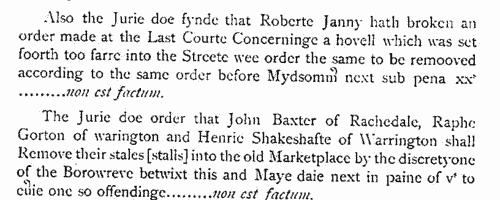
| Inhabitants of Manchester
(1608)
The Court Leet and View of Frankpledge of the manor of Manchester in Lancashire was held twice a year on the first Thursdays after Easter and Michaelmas. The record of each court starts with a list of the jurors, and then records the deaths of tenants and burgesses, with the names of their heirs, who were to do suit to the court; and transfers of burgages by sale, and homage of new burgesses. Then there are presentments of all manner of minor enroachments and misdemeanours, such as blocking of ditches, stopping of highways, noisome drains, &c. Finally there are new general ordinances, often with the appointment of officers to see that they are enforced. Every Michaelmas saw the swearing in of a long list of officers for the coming year, including the borough reeve, constables, market lookers, mise layers and gatherers, sealers of leather, officers for fruit and wholesome bread and (the prevention of) football, aletasters, bylawmen (burleymen), scavengers, (ap)praisers, catchpole, swineherd, and also the affeerers, who judged the fines to be levied by the court. These posts were filled by householders or their appointees. The sample scan is taken from 1597. This index covers the court of 12 October 1608. | Sample scan, click to enlarge
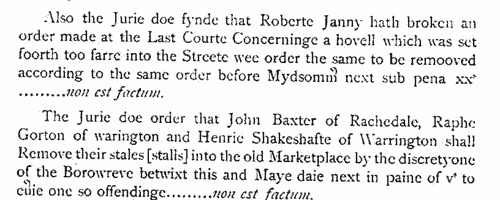
| Inhabitants of Manchester
(1609)
The Court Leet and View of Frankpledge of the manor of Manchester in Lancashire was held twice a year on the first Thursdays after Easter and Michaelmas. The record of each court starts with a list of the jurors, and then records the deaths of tenants and burgesses, with the names of their heirs, who were to do suit to the court; and transfers of burgages by sale, and homage of new burgesses. Then there are presentments of all manner of minor enroachments and misdemeanours, such as blocking of ditches, stopping of highways, noisome drains, &c. Finally there are new general ordinances, often with the appointment of officers to see that they are enforced. Every Michaelmas saw the swearing in of a long list of officers for the coming year, including the borough reeve, constables, market lookers, mise layers and gatherers, sealers of leather, officers for fruit and wholesome bread and (the prevention of) football, aletasters, bylawmen (burleymen), scavengers, (ap)praisers, catchpole, swineherd, and also the affeerers, who judged the fines to be levied by the court. These posts were filled by householders or their appointees. The sample scan is taken from 1597. This index covers the court of 6 October 1609. | Sample scan, click to enlarge
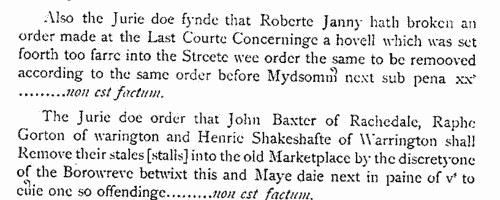
| Inhabitants of Manchester
(1610)
The Court Leet and View of Frankpledge of the manor of Manchester in Lancashire was held twice a year on the first Thursdays after Easter and Michaelmas. The record of each court starts with a list of the jurors, and then records the deaths of tenants and burgesses, with the names of their heirs, who were to do suit to the court; and transfers of burgages by sale, and homage of new burgesses. Then there are presentments of all manner of minor enroachments and misdemeanours, such as blocking of ditches, stopping of highways, noisome drains, &c. Finally there are new general ordinances, often with the appointment of officers to see that they are enforced. Every Michaelmas saw the swearing in of a long list of officers for the coming year, including the borough reeve, constables, market lookers, mise layers and gatherers, sealers of leather, officers for fruit and wholesome bread and (the prevention of) football, aletasters, bylawmen (burleymen), scavengers, (ap)praisers, catchpole, swineherd, and also the affeerers, who judged the fines to be levied by the court. These posts were filled by householders or their appointees. The sample scan is taken from 1597. This index covers the court of 9 October 1610. | Sample scan, click to enlarge
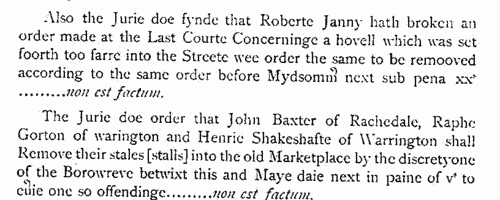
| Inhabitants of Cambridge
(1504-1635)
Cambridge comprised fourteen ancient parishes, plus the university (which was extra-parochial), in the diocese of Ely. The church of St Mary the Great (as opposed to St Mary the Less) in the Market Place (juxta forum) has churchwardens' accounts surviving from 1504 onwards. Those from 1504 to 1635 were transcribed by J. E. Foster for the Cambridge Antiquarian Society and published in 1905. The two churchwardens were chosen annually: the previous year's churchwardens each chose another parishioner: those two then each chose three other parishioners: the resulting eight then chose the new year's churchwardens, the wardens of the Light of the Rood, and the wardens of the Mass of Jesus. Auditors were also chosen, usually out of the eight, to examine all the wardens' accounts at the end of the year. The churchwardens' accounts are largely concerned with the costs of repair of the church and its furnishings, and include the names of tradesmen and workmen. Each Easter a rate called Easter money was raised was raised from all householders in the parish, and additional rates are occasionally levied for unusual expenses, such as steeple reconstruction. These 'Easter book' lists give a complete list of householders for the parish, excepting the poor. The church's income also included the rents from some houses in the parish, and the names of the tenants appear. The offices of the Light of the Rood and the Mass of Jesus were abolished during the Reformation. The accounts of the Light of the Rood, i. e., for candles burnt before the crucifix, often include a list of sums received for funerary diriges (dirges) for the year, from which the year of death of the more prosperous parishioners can be traced in this early period. | Sample scan, click to enlarge

|
Research your ancestry, family history, genealogy and one-name study by direct access to original records and archives indexed by surname.
|











